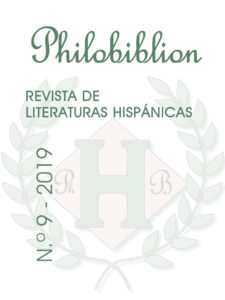The blind will of Las ciegas hormigas: from Schopenhauer and Nietzsche to (Unamuno, Baroja) Pinilla
Keywords:
Noumenos, Schopenhauer, Nietzsche, Ramiro PinillaAbstract
The Blind Ants (1960), first Ramiro Pinilla’s novel, brings to the present the keys of the Vasque narrative about nineteenth existencialism Baroja and Unamuno’s thoughts. Noumeno and phenoumeno -Schopenhauer’s concepts- are opposite, but both of them become into blind and power will (exposed by Nietzsche). They are also connected with the narrative of the Spanish authors, thanks to the facts starred by the citizens in Algorta. Pinilla will develop, in addition, the greek or classical tragedy forms, because noumenic strength is fatum or destiny, hamarties and hybris (completely different from right arête), all of them over the punished Jauregui’s family.Downloads
References
Acillona, Mercedes (2015), coord.., Ramiro Pinilla: el mundo entero se llama Arrigunaga, Bilbao, Deusto.
Aristóteles, (1997), Poética, Barcelona, Icaria editorial.
Baroja, Pío (1993), El árbol de la ciencia, Madrid, Cátedra.
Calderón de la Barca, Pedro (1985), La vida es sueño, Madrid, Cátedra.
Cioran, Emil (2014), Del inconveniente de haber nacido, Madrid, Taurus.
Clavería, Carlos (1970), Temas de Unamuno, Madrid, Gredos.
Deleuze, Gilles (1986), Nietzsche y la filosofía, Barcelona, Anagrama.
Frye, Northrop (1977), Anatomía de la crítica. Caracas, Monte Ávila Editores C.A.
Nietzsche, Friedrich (1982), Así habló Zarathustra, Barcelona, Orbis.
Nietzsche, Friedrich (2003), La Gaya Ciencia, Barcelona, El Barquero.
Nietzsche, Friedrich (2010), La genealogía de la moral.
En línea: http://www.biblioteca.org.ar/libros/211756.pdf. Último acceso el 20-ene-2018.
Ortega y Gasset, José (1943), Prólogo a Veinte años de caza mayor, del Conde de Yebes.
En línea: https://www.unaccyt.org/.../Prologo-a-20-años-de-caza-mayor-Ortega-y-Gasset. Último acceso el 25-ene-2018.
Philonenko, Alexis (1988), Schopenhauer. Una filosofía de la tragedia, Barcelona, Anthropos.
Pinilla, Ramiro (2014), Las ciegas hormigas, Barcelona, Tusquets.
Schopenhauer, Arthur (2003), El mundo como voluntad y representación I, traducción, introducción y notas de Pilar López de Santa María.
En línea: http://wwwserbal.pntic.mec.es/AParteRei/fuster72.pdf. Último acceso el 15-ene-2018.
Unamuno, Miguel, (1999). Del sentimiento trágico de la vida, Madrid, Alianza editorial.
